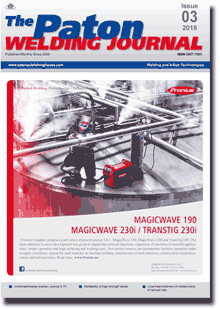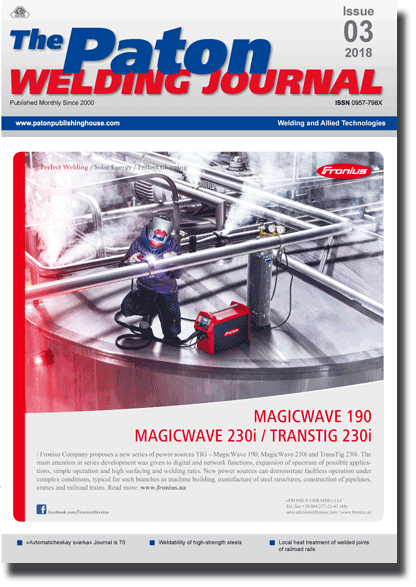| 2018 №03 (06) |
DOI of Article 10.15407/tpwj2018.03.07 |
2018 №03 (08) |

The Paton Welding Journal, 2018, #3, 32-35 pages
Electroslag surfacing with large-section electrode at direct current in current-supplying mould
Yu.M. Kuskov, V.G. Soloviov, P.P. Osechkov and V.V. Osin
E.O. Paton Electric Welding Institute of the NAS of Ukraine 11 Kazimir Malevich Str., 03150, Kyiv, Ukraine. E-mail: office@paton.kiev.ua
Abstract
The influence of different circuits of electrode connection to one or two DC power sources on base metal penetration at electroslag surfacing of end faces was studied. It is established that the circuits of electrode connection both to one and two DC power sources can be used to obtain minimum and uniform penetration. Shortening of the distance from the processed surface (billet end face) to the current-conducting section of current-supplying mould leads to an increase of surfacing efficiency and reduction of specific power consumption. 12 Ref., 1 Table, 3 Figures.
Keywords: electroslag surfacing of end faces, large-section electrode, current-supplying mould, DC power sources, processed surface, base metal penetration
Received: 07.10.17
Published: 12.04.18
References
- (1976) Electroslag furnaces. Ed. by B.E. Paton et al. Kiev, Naukova Dumka [in Russian].
- (1980) Electroslag welding and surfacing. Ed. by B.E. Paton. Moscow, Mashinostroenie [in Russian].
- (1982) Electroslag technology abroad. Ed. by B.E. Paton et al. Kiev, Naukova Dumka [in Russian].
- Chen, Ch.S., Gao, R.F. (1989) Investigation of electroslag remelting in composite mold with lined upper section. Problemy Spets. Elektrometallurgii, 4, 42–47 [in Russian].
- Latash, Yu.V., Matyakh, V.N. (1987) Modern methods of production of especially high quality ingots. Ed. by B.E. Paton et al. Kiev, Naukova Dumka [in Russian].
- Mironov, Yu.M. (2002) Effect of current type on processes in electroslag installations. Elektrometallurgiya, 4, 25–32 [in Russian].
- (1986) Metallurgy of electroslag process. Ed. by B.E. Paton et al. Kiev, Naukova Dumka [in Russian].
- Kuskov, Yu.M., Soloviov, V.G., Zhdanov, V.A. (2017) Electroslag surfacing of end faces with large-section electrode in current-supplying mould. The Paton Welding J., 12, 29–32. https://doi.org/10.15407/tpwj2017.12.05
- Kuskov, Yu.M., Soloviov, V.G., Osechkov, P.P., Osin, V.V. (2018) Electroslag surfacing of billet end faces with application of consumable and nonconsumable electrodes. Ibid., 2, 38–41. https://doi.org/10.15407/tpwj2018.02.08
- Dudko, D.A., Rublevsky, I.N. (1958) Effect of current type and polarity on metallurgical processes in electroslag welding. Svarka, 3, 69–78 [in Russian].
- Ksyondzyk, G.V. (1975) Current-supplying mold providing rotation of slag pool. Elektrometallurgiya, 27, 32–40 [in Russian].
Suggested Citation
Yu.M. Kuskov, V.G. Soloviov, P.P. Osechkov and V.V. Osin (2018) Electroslag surfacing with large-section electrode at direct current in current-supplying mould. The Paton Welding J., 03, 32-35.The cost of subscription/purchase order journals or individual articles
| Journal/Currency | Annual Set | 1 issue printed |
1 issue |
one article |
| TPWJ/USD | 384 $ | 32 $ | 26 $ | 13 $ |
| TPWJ/EUR | 348 € | 29 € | 24 € | 12 € |
| TPWJ/UAH | 7200 UAH | 600 UAH | 600 UAH | 280 UAH |
| AS/UAH | 1800 UAH | 300 UAH | 300 UAH | 150 UAH |
| AS/USD | 192 $ | 32 $ | 26 $ | 13 $ |
| AS/EUR | 180 € | 30 € | 25 € | 12 € |
| SEM/UAH | 1200 UAH | 300 UAH | 300 UAH | 150 UAH |
| SEM/USD | 128 $ | 32 $ | 26 $ | 13 $ |
| SEM/EUR | 120 € | 30 € | 25 € | 12 € |
| TDNK/UAH | 1200 UAH | 300 UAH | 300 UAH | 150 UAH |
| TDNK/USD | 128 $ | 32 $ | 26 $ | 13 $ |
| TDNK/EUR | 120 € | 30 € | 25 € | 15 € |
AS = «Automatic Welding» - 6 issues per year;
TPWJ = «PATON WELDING JOURNAL» - 12 issues per year;
SEM = «Electrometallurgy Today» - 4 issues per year;
TDNK = «Technical Diagnostics and Non-Destructive Testing» - 4 issues per year.


